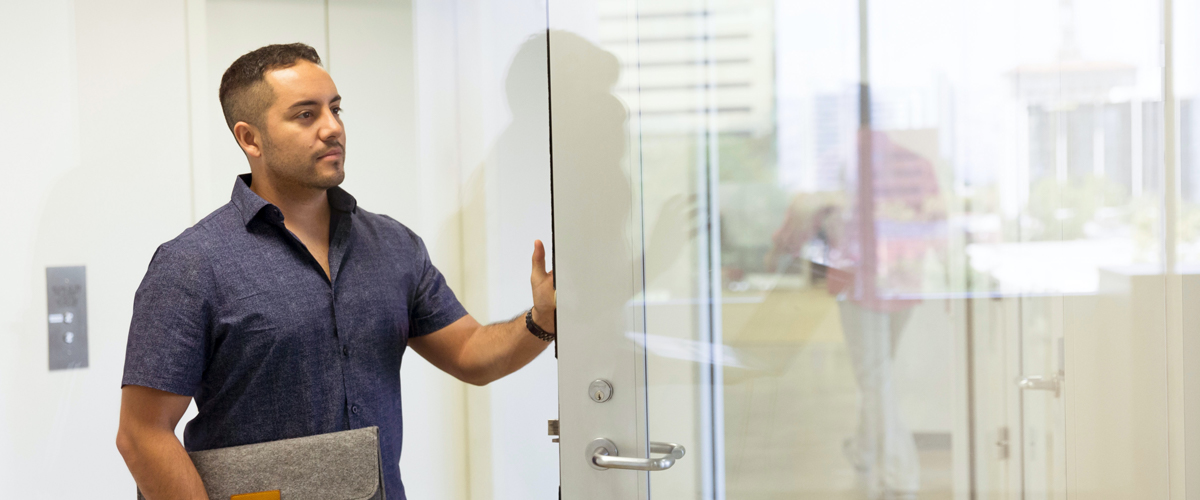Facing your next job interview with confidence
Are you applying for a new job? You may be experienced and well qualified, and have submitted the perfect résumé. But in today’s world, it’s that face-to-face interview that really counts. To gain the full advantage, you’ll need to be facing your next job interview with confidence. Here are some great strategies on how to just that.
1. Do your homework.
If you’ve done your research and preparation thoroughly, it will come across confidently and naturally during an interview. So…
• Know your résumé thoroughly. Be able to elaborate on each item and to discuss strengths and weaknesses confidently, positively, and honestly.
• Assemble your résumé, other documentation, and examples of previous work as support material for use when appropriate during the interview.
• Familiarise yourself with the company and the position you have applied for. You needn’t be an expert, but take note of a few important facts. Try to make some global observations based on the content of printed materials you examine (company publications, local newspapers, or annual reports) or the people you speak with beforehand. Be able to talk about the organisation’s successes, and emphasise what strengths you can now bring to the company or the specific position.
• Prepare your responses – but don’t overdo it. By all means prepare thoroughly for the questions you expect to get at the interview, but don’t be so thorough as to be unprepared for those you don’t expect. And don’t be so intent on giving your prepared responses that you answer questions you were never asked.
• Be ready to ask some intelligent questions of your own. Interviewers often give you that opportunity.
2. Rehearse.
The best way to build confidence and manage uncertainty is to practice beforehand. So rehearse questions related to each of the selection criteria and other fundamental questions such as these: Why did you apply for this position? What have been your major achievements?
Which of these relate most closely to the position you are seeking? How well are you going to be able to perform in the role? What is your potential? Why should we choose you? What are your special qualities that set you apart from the other applicants?
Why are you the best person for the job? How will it fit in with your career plans?
Practice your responses aloud (running them through your mind is not the same). Engage in mental imaging: actually see yourself performing well; hear the certainty in your voice.
Visualise the introductions, your final statement to the panel, and your exit. Remember Don Clayton’s advice in ‘Up the Ladder without Snakes’: ‘Most of us tend to make rehearsal a half-hearted affair and we are rewarded (or punished) for this when we walk into the room and feel our minds melt into mush.’
3. Pay attention to first impressions.
First impressions count a great deal:
• Look the part. Dress appropriately.
• Make sure you arrive ten minutes early – ample time to psych yourself up. Never arrive late. Ensure you don’t feel rushed. Breathe in deeply; exhale slowly.
• Walk in confidently and be sure to smile, make direct eye-contact, and introduce yourself. Carry your materials in your left hand, so that you are ready to return a handshake firmly without fumbling.
• Relax. Try to give the impression that you are approaching the interview confidently and calmly.
4. Use these proven interviewee tactics.
Be familiar with and use the following techniques during the interview itself:
• Support your answers with examples.
• Think before you open your mouth. Take a few seconds before responding.
• Make your answers long enough to cover the topic and short enough to hold interest.
• Gauge how the panel is reacting (tired, alert, interested, bored?). Respond accordingly.
• Remember: most people hear only about 10 per cent of what you say. The rest is how you say it – your tone of voice, body language, facial expressions.
• A winning vocabulary is essential. Judiciously use buzzwords that emphasise your commitment, awareness, effectiveness, and knowledge – e.g. empower,
excellence, mission, participate, initiate, collaborate, accountable, cooperative learning, lead, performance-based, etc.
• Speak positively of past experience. Emphasise the positive aspects of your previous positions. Acknowledge the contributions of colleagues to show you’re a team player.
• Listen attentively during the session.
• Don’t try to answer questions you don’t understand. Request clarification.
• If you are interview number three or more for the day, the panel could well be in a daze by the time it’s your turn. You’ll need to revive interest – a non-routine answer, some appropriate humour, a novel solution – nothing out of character, just enthusiasm and pizzazz to set you apart from the pack.
• Watch your body language: don’t deliver your lines from behind a tangle of crossed legs, folded arms, or slumped shoulders. Sit erect and try to mirror the body language of the interviewer.
• Answer questions truthfully. Misrepresentations could return to haunt you.
5. Leave a good impression.
Interviewers forget 85 percent of what you have said an hour after you’ve gone. You need to impress positively in the final phases of the interview. The panel should remember you as confident, enthusiastic, energetic, and dependable. End as you began – with a smile, direct eye contact, firm handshake, and a few positive words.
Looking to progress your career?
Global Training Institute is a Registered Training Organisation that has been helping people succeed and achieve their career goals for over 15 years. We offer accredited online training in the areas of Quality Auditing, Leadership & Management, Business, Civil Construction, Local Government, Project Management, and Work Place Health & Safety.

